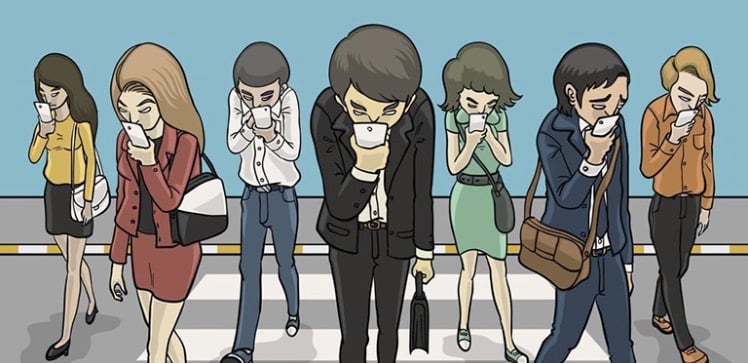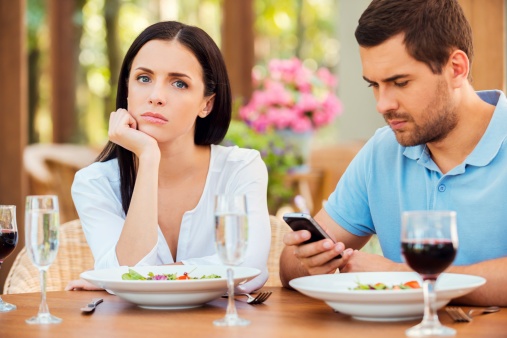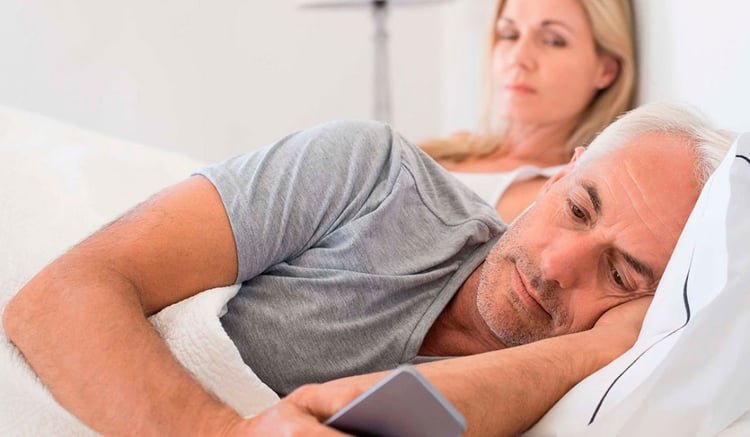
17 October 2018

phubbing (v)
1The act of snubbing someone in a social setting by looking at your phone instead of paying attention to them.
Phubbing was created as a word in May 2012 by Australian advertising agency, McCann. The agency was tasked with promoting the sixth edition of the Macquarie Dictionary and wanted to demonstrate how language is always changing. Soon after announcing the new word, the Stop Phubbing campaign was launched and media coverage of the new word and debates around mobile phone etiquette went viral.
It's commonplace in Australia for people to pull out their mobile phone every time they have a few spare minutes, whether they are on public transport, waiting in a queue, or during television commercials. However, we have taken the practice a whole lot further, even checking our phones in the middle of a social interaction.
One study found that more than 17 percent of people phub at least four times a day; while almost 32 percent of people report being phubbed two to three times a day.
Both phubbing and being phubbed are harmful to our sense of wellbeing. Many studies have shown that phubbing makes face-to-face interactions less meaningful.
One study found that people who used their phones while eating with friends or family said they enjoyed their meal less and felt more distracted and less engaged than those who didn’t use tech at the table. A follow-up experiment found that phone use makes face-to-face interactions away from the table less enjoyable, too.
A study, published in Computers in Human Behavior in 2016, found that texting during a conversation made the talk less satisfying for the people having it, compared to people who interacted without phones.
A study in the Journal of Social and Personal Relationships found that the mere presence of a mobile phone during a conversation — even if no one was using it — was enough to make people feel less connected to each other.
“Ironically, phubbing is meant to connect you, presumably, with someone through social media or texting,” says Emma Seppälä, a psychologist at Stanford and Yale universities and author of The Happiness Track. “But it actually can severely disrupt your present-moment, in-person relationships.”

Being phubbed does not feel good because it is a threat to four of our “fundamental needs” being
When someone is phubbed, they may feel rejected, excluded, and not important. That can have a significant impact on mental health.
We are extremely attuned to other people. When someone’s eyes wander, we intuitively know what brain studies also show: Their mind is also wandering. We feel unheard, disrespected, and disregarded.
Two separate recent studies found that when spouses phub each other, they’re more likely to experience depression and lower marital satisfaction.
In a study poignantly titled, “My life has become a major distraction from my cell phone,” Meredith David and James Roberts suggest that phubbing can lead to a decline in one of the most important relationships we can have as an adult — the one with our life partner.
According to their study of 145 adults, phubbing decreases marital satisfaction, in part because it leads to conflict over phone use. By lowering marital satisfaction, phubbing affected a partner’s depression and satisfaction with life. A follow-up study by Chinese researchers assessed 243 married adults with similar results: Partner phubbing, because it was associated with lower marital satisfaction, contributed to greater feelings of depression.
"If your life partner is on the phone, that means that they are prioritising something else over you in those moments of togetherness, and that hurts.
"When we are on our phones, we are not looking at other people and not reading their facial expressions — tears in their eyes, frowns, smiles. We don’t hear the nuances in their tone of voice or notice their body posture. This distraction impacts on our ability to feel empathy."

People who are phubbed are more likely to reach for their phones and try to engage with their social media network in order to fill that void. This is the start of a vicious cycle.
Plus, diving into social media may actually make the problem worse. Research around engaging with social media has found that social media can make feelings of depression worse, and the more you use social media, the more likely you are to feel depression or anxiety.
Phubbing may also hurt your reputation as the habit is considered particularly offensive by many people.
It also signifies an addictive personality with many experts agreeing that a device habit that begins to interfere with everyday life is worrisome. Feeling compelled to text or scroll through the phone during face-to-face conversations may fit that bill.
“Phone users are generally seen as less polite and attentive—and as poorer conversationalists. You might miss critical impacts of human moments that really make up what a human life is. It’s really scary that we’re replacing that with looking down at a screen,” says Seppälä.
3 Strategies to Reduce Telecom Cost